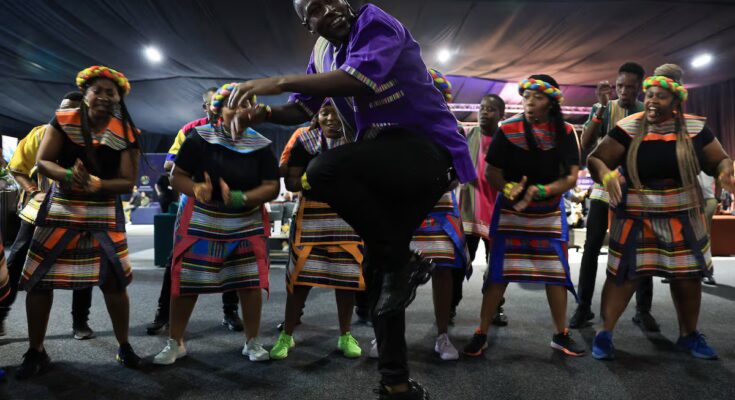Johannesburg hosted the first G20 summit on African soil, and the current South African presidency took the opportunity to amplify the continent’s desire to create a new place in the world, a new order that corrects abuses and inequalities.
“As this is the first G20 summit to be held in Africa, it brings with it the hopes and must reflect the aspirations of the people of this continent and the world,” Cyril Ramaphosa, president of South Africa, said in Johannesburg. His government, he assured, “has sought to ensure that the development priorities of the Global South and the African continent are expressed firmly and permanently on the G20 agenda. This is important not only for the people of Africa and the Global South; it is vital for global stability and security, to relieve pressure on resources, manage population movements and reduce the risk of conflict”, said the president.
Of course, Africa is a huge and diversified continent, which includes disparate situations and strong internal divergences. This does not mean, however, that there are no clear common denominators, which consist in the desire to obtain different treatment – far from extractive and condescending logics – which recognizes the new damages of the domination of the northern hemisphere – once colonialism, now the disastrous effects of climate change generated by others – and the need to reformulate some balances and structures of the world order.
Reading the final declaration of the G20 leaders represents an eloquent summary of those aspirations. The order of the points raised, with all those that matter for Africa and the Global South placed carefully at the beginning with an uncompromising rhythm, almost sounds like a cry. Although it does not contain political commitments with real potential for change, politics is also made by consolidating narratives.
The sequence of sections is very clear: strengthening resilience and response to climate disasters, which hit less prosperous nations with particular intensity; take measures to ensure debt sustainability for low-income countries; mobilize financing for just energy transitions; take advantage of critical minerals for inclusive growth and sustainable development, avoiding abusive, asymmetric and polluting extractivist logics; inclusive economic growth, industrialisation, employment and reduction of inequalities; food safety; Partnership Plan for Africa; strengthen the Financial Track approach in Africa and improve its effectiveness.
These are the demands of Africa put forward by the South African presidency in a summit which was also attended by the African Union, a full member of the G20 since last year, and to which countries such as Nigeria, Egypt, Algeria, Ethiopia and Sierra Leone, as well as various pan-African institutions, were invited.
Africa continues to remain in the news and in the collective imagination due to persistent crises. The violence – now unleashed in the Sahel due to the terrorist wave -, the coups – there have been a disturbing series of them in the last decade -, the plague of corruption, the epidemics, the famines, the painful inequalities.
Another Africa
But there is another Africa. Beatrice Grace Alouch Obado, associate professor in the area of International Relations and Sustainable Development at IE University and Schiller International University, reveals some characteristics of that other Africa. “There is a dynamic and innovative Africa that deserves much more visibility. It is Africa that developed mobile money, decentralized solar systems and digital identities, references that are now studied all over the world,” says Alouch Obado, who participated in Johannesburg at T20 (Think 20, a forum of ideas that is part of the G-20).
“It is also the Africa of the Continental Free Trade Area, which is laying the foundations for a more integrated and competitive regional market. In a world where we see increasing fragmentation, we see how Africa is coming together. And in parallel we also see the growing civic involvement of young people, which is becoming a positive force in many countries, contributing to stronger institutions and more responsive governance,” continues the professor, who was previously the international coordinator of ENIASA, the European Information and Action Network for Africa. Austral, a group of over 100 NGOs within the European Union working to promote peace, democracy and sustainable development in southern Africa.
“The greatest opportunity for prosperity for the 21st century lies in Africa,” Ramaphosa said in his closing remarks at the summit. “Making it happen will require strong cooperation between Africa and the G-20, and certainly between Africa and the rest of the world,” he added. It is an opportunity that lies above all in the extraordinary demographic potential of the continent, a source of youth – with all the prospect of innovation and creativity that this entails – in a world where many regions are ageing.
The peace agreement signed a few days ago in Qatar between the Congo government and the rebel group M23 – supported by Rwanda – projects new hopes for the pacification of a terribly bloody and prolonged conflict. Similarly, a recent International Monetary Fund report highlighted an encouraging degree of resilience in sub-Saharan economies, whose GDP growth is expected to be 4.1% this year and 4.4% next year, despite various global turbulences, and which are showing appreciable symptoms of stabilization and macroeconomic reforms.
However, the IMF warns of persistent and serious fragilities. Likewise, if there is hope in Congo, the fear of violence and new conflicts cannot be underestimated. Not only is the Sahel a nest of terrorists. The recent escalation of verbal aggression between Ethiopia and Eritrea raises serious concerns. Great scourges persist, and in a world where force-based transactionalism prevails, African states that lack it have much to lose. The G20 in South Africa, however, could be an episode at the base of a process of convergence and union that would put African states in a better position to resist the waves of contemporaneity.
Internal discrepancies are great, but history shows that Africans know how to cooperate very well, as happened in the decolonization period. And the current free trade zone is an excellent viaduct to progress along this path.



